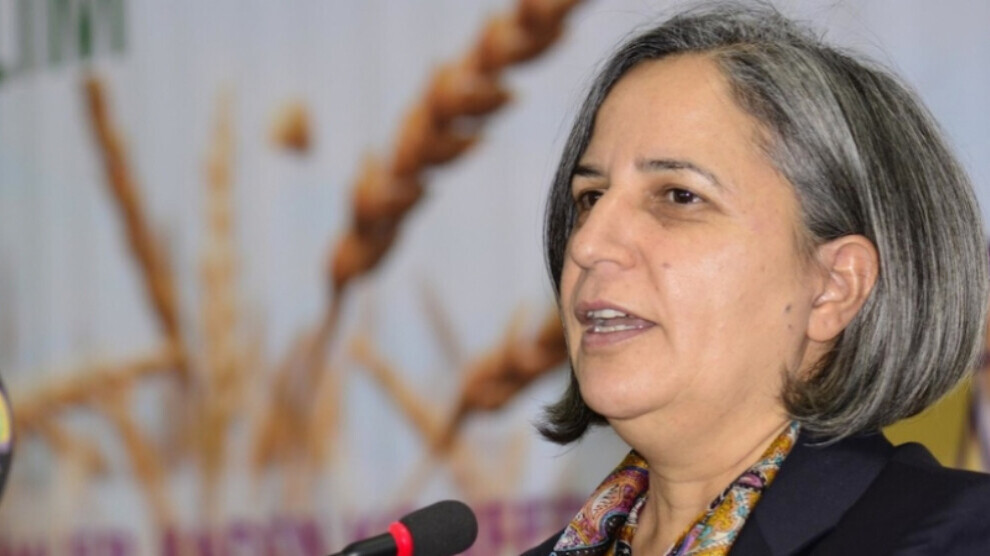Call for judicial action for Gültan Kışanak imprisoned for 7 years
Lawyers call for immediate action for the release of Gültan Kışanak, the former mayor of Amed, who has been behind bars since October 2016.
Lawyers call for immediate action for the release of Gültan Kışanak, the former mayor of Amed, who has been behind bars since October 2016.

Kurdish politician Gültan Kışanak was first arrested at the age of 19 after the military coup of 12 September 1980 and tortured in the dungeon of Amed (Diyarbakir). Among other things, she was held in a two-square-metre dog kennel for six months. After two years of resistance in prison, she studied journalism and worked for Kurdish newspapers, including as editor-in-chief of Özgür Gündem in Istanbul. Later, she went into politics and was a member of the Turkish parliament. In 2014, she was the first woman to be elected mayor in Amed. As mayor of the Kurdish metropolis, she had the prison where she was once tortured converted into a museum. In the course of the mass arrests of HDP politicians in autumn 2016, she was imprisoned and sentenced to a long prison term. She is also one of the defendants in the ongoing Kobanê trial. In prison, she wrote a book and continues to speak out publicly on current issues. Gültan Kışanak is one of the best-known Kurdish politicians and has been in prison as a political hostage of the Turkish regime for seven years.
Kışanak was arrested in October 2016 for alleged connection with the 6-8 October 2014 protests in Turkey and North Kurdistan against the ISIS onslaught on the Kurdish town of Kobanê in northern Syria. The Kobanê Case was filed in 2020 against 108 politicians, of whom 18 are behind bars.
Gültan Kışanak is not released from prison despite the fact that the maximum imprisonment term of 7 years has been completed. Applications have been filed with the Constitutional Court of Turkey (AYM) and the 22nd Heavy Penal Court in Ankara for her release.
Kışanak’s family and lawyers made a statement to denounce the ongoing imprisonment of Kışanak for political reasons despite the completion of the maximum imprisonment term.
The press conference in Istanbul was also attended by HEDEP (Peoples’ Equality and Democracy Party) Law and Human Rights Commission member Several Ballıkaya.
Speaking here, Gültan Kışanak's lawyer, Gül Altay, noted that her client had been detained on 25 October 2016 as part of a wave of arrests against Kurdish politicians that sought to depose the elected mayors of municipalities in the Kurdish region and to appoint trustees in their place.
Altay called on the Constitutional Court to make a precautionary decision for the release of the Kurdish politician in consideration of the completion of the maximum imprisonment term. She noted that courts do not have the right to judicial discretion any more.
Altay stated that applications have been made with the Constitutional Court against the violations of Kışanak’s rights, but no decision has been made yet.
Another lawyer of Kışanak, Cihan Aydın, called the Kobanê Case “the conspiracy case of Turkey”, pointing out that the judiciary has lost its independence and became an “instrument” of the state.
Aydın criticised the judicial ignorance of the Constitional Court’s related decisions against the exceeding of the maximum imprisonment term in the case of Gültan Kışanak.
HEDEP Central Executive Board member Kerem Fırtına called for an immediate end to the rights violations experienced by Gültan Kışanak and demanded her release from prison.
The Kobanê Case
The Kobanê Case was filed in 2020 against 108 people, including the HDP’s former co-chairs, Selahattin Demirtaş and Figen Yüksekdağ, several current and former HDP deputies and mayors, and all the members of the HDP’s Central Executive Board of 2014.
This case was launched as a counter move by the Turkish government just two weeks after the Grand Chamber of the European Court of Human Rights made its final judgment demanding the immediate release of Selahattin Demirtaş. The indictment in the Kobanê Case is based on a Twitter message posted by the HDP on 6 October 2014. This called for democratic protests in solidarity with the people of Kobanê, the Kurdish town in Northern Syria that was fighting against the attacks of ISIS, and also against Turkey’s embargo on the town. The prosecutor is calling for all the defendants to be given aggravated life sentences (without parole) 38 times for the crimes of “destroying the unity of the state and the integrity of the country” and “premeditated murder” of the people who lost their lives in the Kobanê protests. Seventeen politicians are currently being held in pre-trial detention for this case.
The Kobanê case is closely linked with the closure case filed against the HDP, for which it serves as a pretext. In the closure case, the prosecution is mainly based on the alleged role and responsibility of the HDP in the murders that occurred during the Kobanê protests in 2014.